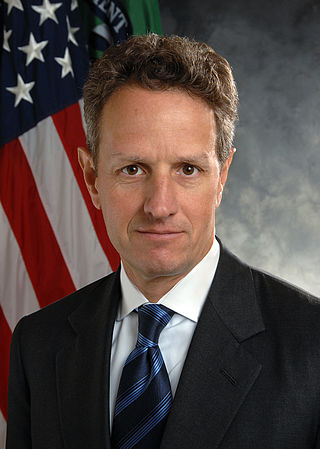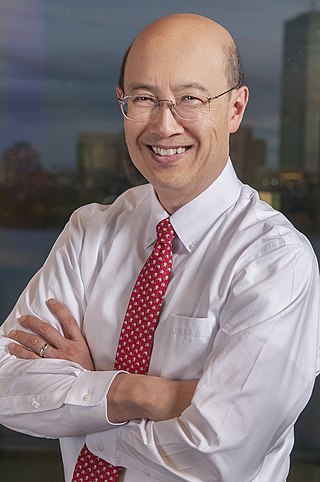Related Research Articles

Robert Cox Merton is an American economist, Nobel Memorial Prize in Economic Sciences laureate, and professor at the MIT Sloan School of Management, known for his pioneering contributions to continuous-time finance, especially the first continuous-time option pricing model, the Black–Scholes–Merton model. In 1997 Merton together with Myron Scholes were awarded the Bank of Sweden Prize in Economic Sciences in Memory of Alfred Nobel for the method to determine the value of derivatives.

Janet Louise Yellen is an American economist serving as the 78th United States secretary of the treasury since January 26, 2021. She previously served as the 15th chair of the Federal Reserve from 2014 to 2018. She is the first person to hold those positions having also led the White House Council of Economic Advisers and the first woman to hold either post.
In finance, systemic risk is the risk of collapse of an entire financial system or entire market, as opposed to the risk associated with any one individual entity, group or component of a system, that can be contained therein without harming the entire system. It can be defined as "financial system instability, potentially catastrophic, caused or exacerbated by idiosyncratic events or conditions in financial intermediaries". It refers to the risks imposed by interlinkages and interdependencies in a system or market, where the failure of a single entity or cluster of entities can cause a cascading failure, which could potentially bankrupt or bring down the entire system or market. It is also sometimes erroneously referred to as "systematic risk".
Matthew Richardson is the Charles E. Simon Professor of Applied Economics and Professor of Finance in the Finance Department at the Leonard N. Stern School of Business of New York University (NYU). He is also the Director of Alternative Investments at the Salomon Center for the Study of Financial Institutions at NYU. and a Research Associate of the National Bureau of Economic Research. Richardson is a co-editor of the Annual Review of Financial Economics.

Lars Peter Hansen is an American economist. He is the David Rockefeller Distinguished Service Professor in Economics, Statistics, and the Booth School of Business, at the University of Chicago and a 2013 recipient of the Nobel Memorial Prize in Economics.

Robert James Shiller is an American economist, academic, and author. As of 2022, he served as a Sterling Professor of Economics at Yale University and is a fellow at the Yale School of Management's International Center for Finance. Shiller has been a research associate of the National Bureau of Economic Research (NBER) since 1980, was vice president of the American Economic Association in 2005, its president-elect for 2016, and president of the Eastern Economic Association for 2006–2007. He is also the co‑founder and chief economist of the investment management firm MacroMarkets LLC.

Timothy Franz Geithner is an American former central banker who served as the 75th United States Secretary of the Treasury under President Barack Obama from 2009 to 2013. He was the President of the Federal Reserve Bank of New York from 2003 to 2009, following service in the Clinton administration. Since March 2014, he has served as president and managing director of Warburg Pincus, a private equity firm headquartered in New York City.

Andrew Wen-Chuan Lo is the Charles E. and Susan T. Harris Professor of Finance at the MIT Sloan School of Management. Lo is the author of many academic articles in finance and financial economics. He founded AlphaSimplex Group in 1999 and served as chairman and chief investment strategist until 2018 when he transitioned to his current role as chairman emeritus and senior advisor.
Gary Bernard Gorton is an American economist who currently serves as the Frederick Frank Class of 1954 Professor of Finance at Yale School of Management. He is known for his theory on the role of repurchase agreements on the 2008 financial crisis.
The Financial Stability Board (FSB) is an international body that monitors and makes recommendations about the global financial system. It was established after the G20 London summit in April 2009 as a successor to the Financial Stability Forum (FSF). The Board includes all G20 major economies, FSF members, and the European Commission. Hosted and funded by the Bank for International Settlements, the board is based in Basel, Switzerland, and is established as a not-for-profit association under Swiss law.

Markus Konrad Brunnermeier is an economist, who is the Edwards S. Sanford Professor of Economics at Princeton University.
Macroprudential regulation is the approach to financial regulation that aims to mitigate risk to the financial system as a whole. In the aftermath of the late-2000s financial crisis, there is a growing consensus among policymakers and economic researchers about the need to re-orient the regulatory framework towards a macroprudential perspective.
Joseph Gerard Haubrich is an economist and consultant. His work focuses on financial institution and regulations research.

Yaga Venugopal Reddy is an Indian economist and a retired Indian Administrative Service (IAS) officer of the 1964 batch belonging to Andhra Pradesh cadre. Reddy served as governor of the Reserve Bank of India (RBI), India's central bank, from September 2003 until September 2008.
John Geanakoplos is an American economist, and the current James Tobin Professor of Economics at Yale University.

Jon Danielsson is an economist teaching at the London School of Economics and active in domestic and international policy debates. He received his PhD in the economics of financial markets from Duke University in 1991.
Lasse Heje Pedersen is a Danish financial economist known for his research on liquidity risk and asset pricing. He is Professor of Finance at the Copenhagen Business School. Before that, he held the position of a Professor of Finance and Alternative Investments at the New York University Stern School of Business. He has also served in the monetary policy panel and liquidity working group at the Federal Reserve Bank of New York and is a principal at AQR Capital Management.
Edward J. Kane was an American economist and writer. He was a long-time student of incentive conflict in financial regulation and in crisis-management policies. His writing contends that too-big-to-fail policies are rooted in the cultural norms of major central banks around the world.
Rama Cont is the Professor of Mathematical Finance at the University of Oxford. He is known for contributions to probability theory, stochastic analysis and mathematical modelling in finance, in particular mathematical models of systemic risk. He was awarded the Louis Bachelier Prize by the French Academy of Sciences in 2010.
Luc Laeven is a Dutch economist, director-general of the research department of the European Central Bank 2015–present. Previously he held senior posts at the International Monetary Fund and the World Bank. He was also a Professor Finance at Tilburg University from 2009 to 2019. He has been a research fellow at the Centre for Economic Policy Research in London since 2009.
References
- ↑ "Andrew Metrick". yale.edu. Retrieved February 24, 2017.
- ↑ "Andrew Metrick" . Retrieved February 24, 2017.
- ↑ "Fellows". upenn.edu. Archived from the original on October 2, 2016. Retrieved February 24, 2017.
- ↑ "Metrick, Andrew". worldcat.org. Retrieved February 24, 2017.
- 1 2 "Biography". Yale School of Management Faculty. Yale. Retrieved February 18, 2018.
- ↑ "CV" (PDF). Yale. Retrieved February 18, 2018.
- ↑ "Andrew Metrick". Google Scholar. Retrieved February 18, 2018.
- ↑ "Summer Institute 2017". NBER. Retrieved February 18, 2018.
- ↑ "CV" (PDF). Yale. Retrieved February 18, 2018.
- ↑ "About". Yale Program on Financial Stability. Retrieved February 18, 2018.
- ↑ "CV" (PDF). Yale. Retrieved February 18, 2018.
- ↑ "Bernanke, Paulson and Geithner Join Yale Effort to Update Crisis-Response Playbook". Wall Street Journal. Retrieved February 18, 2018.
- ↑ "Yale to Build Tool Offering Real-Time Lessons on Financial Crises". Wall Street Journal. Retrieved February 18, 2018.
- ↑ "Degree of Danger: Yale University Plans Master's in Systemic Risk". Wall Street Journal. Retrieved February 18, 2018.
- ↑ "Master's Degree in Systemic Risk". Yale School of Management. Retrieved February 18, 2018.
- ↑ "The Global Financial Crisis". Coursera. Retrieved February 18, 2018.
- ↑ "CV" (PDF). Yale. Retrieved February 18, 2018.